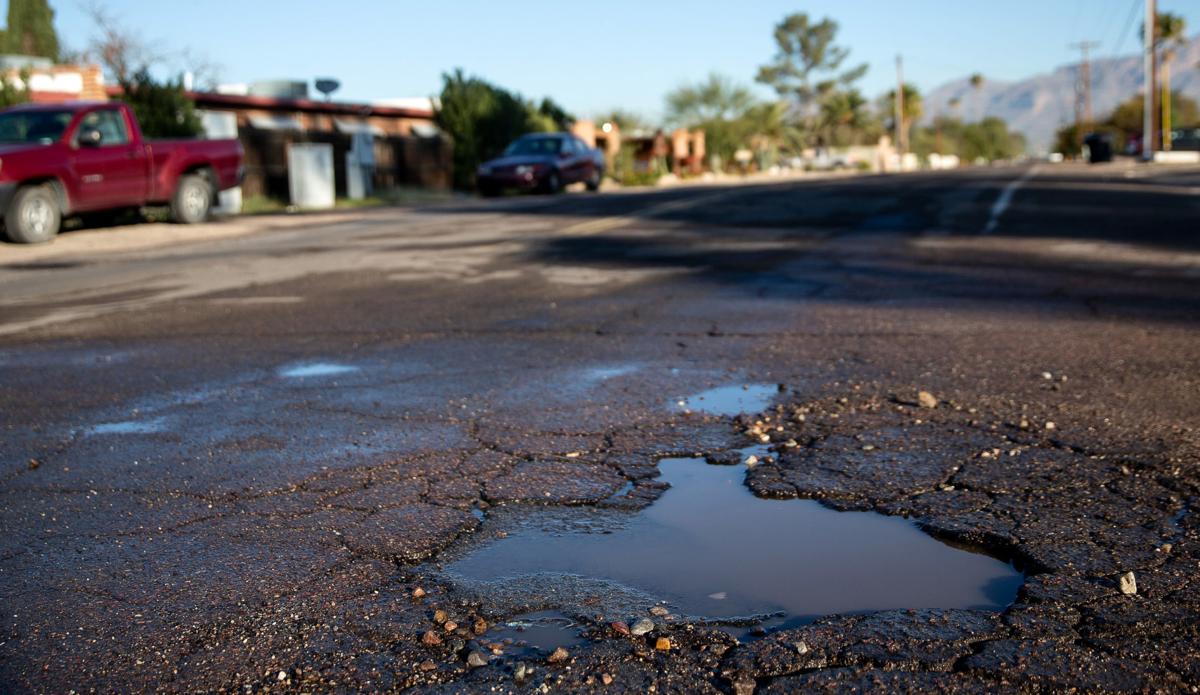Tucson voters will be asked to approve a new ballot initiative called Proposition 411 this May, a measure that could provide $740 million to repave residential roads and upgrade street safety over the next 10 years.
The new measure won’t raise taxes and will instead generate cash by extending a half-cent sales tax that’s been collected in Tucson since 2017 through Prop. 101, which has has produced hundreds of millions in revenue but is set to expire in June.
City officials need that tax revenue to continue if they hope to make progress on Move Tucson, a “transportation master plan” to address all of Tucson’s road work needs over the next 20 years. It will require a 50% boost in transportation funding over that period, or an extra $128 million annually.
Prop. 411’s approval in May would put a serious dent in that goal, increasing road work funding by $52 million each year while allowing the city to repave all of its residential streets over the next decade.
But the new measure isn’t a straightforward extension of Prop. 101. Officials chose to exclusively focus on local street projects this time around, removing the public safety funding element that provided about $30 million to city offices like the Tucson Police Department under the 2017 sales tax, for instance.
“Being able to extend that investment for the next 10 years, that half-cent sales tax, will give us the opportunity to reach all of the neighborhood streets in the city of Tucson,” Mayor Regina Romero said. “It is super important to be able to make that investment in our community.”
The plan for the proposition was finalized after a unanimous City Council vote on Tuesday. It will split the revenue into two categories, similar to previous ballot measures like Prop. 101.
About 80% of the Prop. 411 funds — or more than $59 million annually — will go toward repaving local streets, an effort that won’t be covered by any other transportation funding initiatives if the new measure doesn’t pass this spring.
“Residential streets are our responsibility and that’s the reason I think it’s so important for this council to really stick with this sales tax,” Councilman Steve Kozachik said.
The remaining 20% of Prop. 411 funds will go to roadway safety improvements like upgraded traffic signals and new streetlights. That shakes out to about $15 million each year dedicated to helping Tucson achieve its “Vision Zero goal” of eliminating traffic fatalities.
“We’re killing too many people in this city. We’ve endorsed Vision Zero, and I think the addition of the safety and outside the curb line elements are going to help us with getting closer to that goal,” Kozachik said. “We’re nowhere near it yet, so I think that’s an important piece of it.”
Although the new initiative is virtually identical to Prop. 101 in many ways, there are some significant differences between the two measures. For example, Prop. 411 could be approved for a 10-year window or double the life span of the 2017 sales tax.
But the biggest change is where those funds are going: More than half of the Prop. 101 money was used to cover vehicle, equipment and facility costs for public safety offices like the Tucson Police and Fire departments. That’s all been completely cut from the upcoming Prop. 411 measure.
City officials vowed to use at least $18 million in general fund money during each of the next five years to make up for excluding those offices — which also includes the 911 call center — from receiving the new sales tax revenue. That’s still 40% less money than public safety has been receiving under Prop. 101, however.
TPD Chief Chad Kasmar said he supports Prop. 411 despite being cut out of the initiative, calling city street repair a “critical community need.” Similar sentiments were also expressed by fire department officials.
“The important piece to keep in mind is that the needs continue into the future. Vehicles age, equipment ages and changes in technology occur rapidly, often rendering some equipment functionally obsolete within three to five years,” said Fire Chief Chuck Ryan. “($90 million over the next five years) is a significant investment and will help keep the momentum created by Prop 101. I am committed to working with the city manager to responsibly and realistically present the unmet needs, prioritize them, and find ways to fund them within existing revenue streams to ensure quality service delivery for the community well into the future.”
Improvement projects on “collector” roads, which lead from small streets onto main roads, were also cut from the Prop. 411 initiative. Officials vowed to use other funds to cover that exclusion as well but did not specify the funding level.
Regardless, a “no” vote on Prop. 411 won’t change where the money goes because voters won’t have the option to tweak the ballot language. The only thing residents can now decide is whether to greenlight the multimillion-dollar initiative or vote against it, which would cripple the city’s ability to fill potholes on residential streets.
Prop. 411 will appear on the ballot during Tucson’s special election that’s scheduled for May 17. If approved by city voters, an oversight committee will be established to publicly track how the tax revenue is used.





